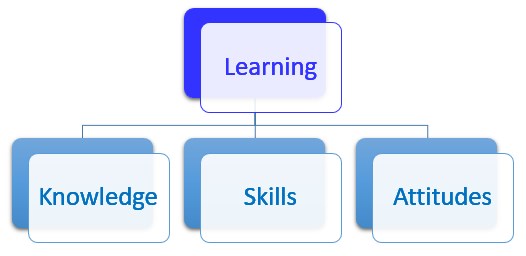Knowledge, Skills, and Attitudes
Learning falls into one of three categories. These categories are often referred to as KSAs.
- Knowledge
- Skills
- Attitudes
Knowledge: cognitive or mental abilities used to retain and process information
Skills: physical abilities used to perform activities or tasks
Attitudes: feelings or emotional about someone or something
Learning Categories for Knowledge, Skills, and Attitudes (KSA’s)
If a person is learning something new, it will fall into one of the three categories.
- Learning facts and concepts would fall into the category of knowledge.
- Learning how to do something would be in the skills category.
- Learning to form a new or different viewpoint or belief would fall into the attitude category.
Training and Educational Programs for KSA’s
Through educational and training activities, a person can acquire new knowledge, develop new skills, or form a new attitude.
Typically, most training and educational programs have focused on the development of knowledge and skills, as those are the ones that are most observable and easiest to measure. Attitudes, on the other hand, are addressed the least by traditional training and educational programs because they are the most difficult for people to develop, and are the hardest to measure for results.
Knowledge, Skills, and Attitudes Defined
About Knowledge, Skills, and Attitudes (KSA’s)
Knowledge
Knowledge is the condition of being aware of something. It is the cognitive processing of information. It includes the recall, recognition, understanding, application, and evaluation of facts, patterns, and concepts.
Knowledge can be measured with written or oral exams where a person documents or explains what they know.
Knowledge of the facts and concepts form the foundation for the ability to apply the skills to perform a task or to modify an attitude. A person would need to have a basic knowledge of the subject before developing the skill or attitude. For example, a person would need to learn the ingredients and steps involved in making cookies (knowledge) before they actually perform the task of making them (skill).
Skills
Skills relate to the ability to physically perform an activity or task. It includes physical movement, coordination, dexterity, and the application of knowledge.
Competency and proficiency in the execution of skills requires training and practice. Skills are measured in terms of speed, precision, and/or technique through observation or monitoring.
Skills are usually learned through the transfer of knowledge. Typically, a person acquires the knowledge of how to perform a task and then begins to physically perform the task. For example, a person would typically learn the ingredients and steps involved in making cookies (knowledge), and then physically make them (skill).
Attitudes
Attitude is a way of thinking or feeling about someone or something. It includes the manner in which a person may deal with things emotionally, and it is often reflected in a person’s behavior. A person’s attitude can significantly affect feelings, values, appreciation, and motivations towards something.
Development or adjustment of a person’s attitude may take a considerable amount of time and effort. It is often not easy to change a person’s attitude after it has been formed for a significant amount of time. Additionally, it is difficult to measure a person’s feeling toward and perception about something. It is even more difficult to measure how much change occurred in a person’s attitude as a result of training or educational activities.
Examples
| KSA | Examples of Learning |
| Knowledge | · the parts of an automobile
· the ingredients for making cookies · the names of world leaders |
| Skills | · how to fix an automobile
· how to make cookies · how to send an email |
| Attitudes | · to appreciate other people’s contributions
· to be motivated to work hard · to value good customer relations |



